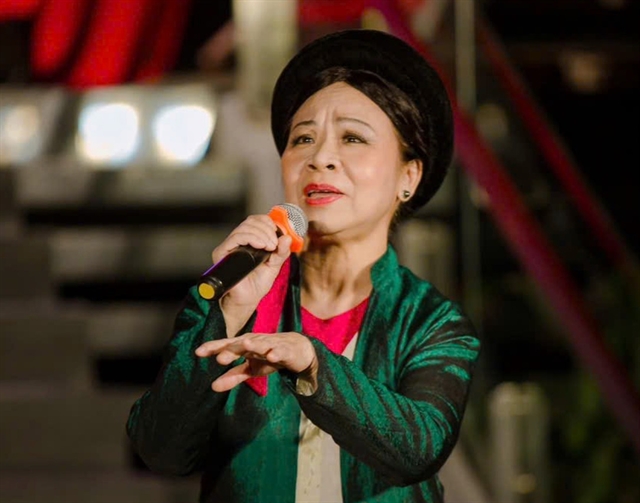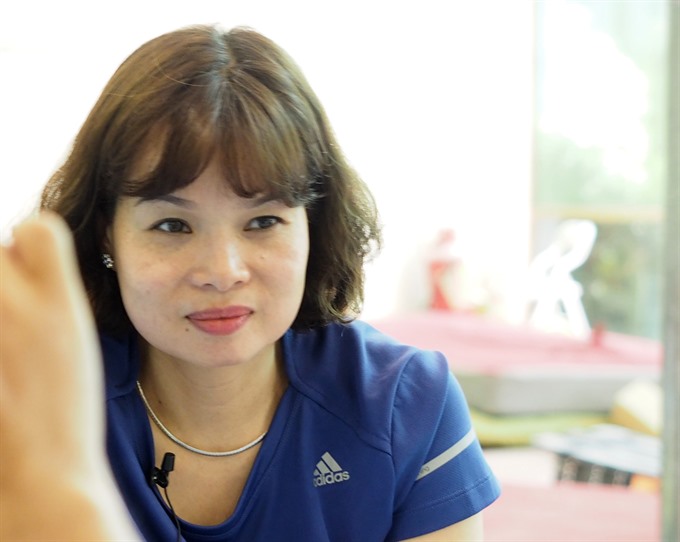 Inner Sanctum
Inner Sanctum

Coach of Viet Nam's national female gymnastics team, Nguyen Thi Thanh Thúy, has been training young gymnasts since 1993. For more than 23 years, Thúy has seen many of her outstanding athletes go on to success at regional and world tournaments. Thanh Nga talks to her about her life and career.
 |
| VNS Photo Doan Tung |
Coach of Việt Nam’s national female gymnastics team, Nguyễn Thị Thanh Thúy, was born in the northern port city of Hải Phòng in 1970. She developed a strong attachment to gymnastics at the age of seven. In 1987, she retired from competition to learn gymnastics coaching in Russia.
In 1993, she began to train female gymnasts in Hải Phòng and then later became coach of the national team.
For more than 23 years, Thúy has trained many outstanding gymnasts who have gone on to success at regional and world tournaments. Thanh Nga talks to her about her life and career.
Inner Santum: Can you tell why you chose gymnastics as a career?
In my childhood, several friends and I signed up for gymnastics lessons at the Hải Phòng gymnasium. After that, I felt the sport was my destiny. After graduating from high school, I earned a scholarship to study gymnastics for five years at a sports university in Russia.
I returned home with the wish of imparting the knowledge I had gained in Russia, and wanting to train the next generation of Vietnamese gymnasts.
Inner Santum: What are the difficulties in training gymnasts?
Gymnastics has specific characteristics that trainees must learn at a very young age. There are a number of difficulties in training youngsters. It requires them to have patience, endurance, flexibility, and a passion for the sport. Not many trainees can meet these demands.
However, I have always been enthusiastic in my approach to training, as well as being able to work in a good environment, so we’ve managed to inspire many good gymnasts. Moreover, we are supported by the leaders of the National Sports Administration with good equipment and experts.
Inner Santum: What do your trainees think about you?
When they were younger, they said that they were very afraid of me because I was fastidious, but even then nobody quit. After that, when they got older, they confided in me. My students and I have shared many sweet and unforgettable memories over the years.
Inner Santum: Gymnastics requires trainees to be passionate because of the hard work involved. Do you have any special methods to help your students focus?
Passion is the No 1 priority for gymnasts. When my students and I face challenges, we often discuss the solution together. This is a psychological method. I am a master of teaching science so I often care about my athletes’ psychology.
Inner Santum: Your gymnasts often carry out difficult moves. Do you have to perform these moves for your trainees to follow?
No. As a coach, I must demonstrate smaller methods and put together steps to complete a move based on physical strength, flexibility and the natural qualities of each gymnast.
I train them in the style of work, posture, and especially the art of performance.
Inner Santum: You found Việt Nam’s top female gymnast Phan Thị Hà Thanh when she was six years old, and have worked with her over 20 years gaining medals at home and abroad. Thanh has retired from competition to become a coach. What do you think about her decision?
I wish Thanh all the best in becoming an excellent trainer. She was a good gymnast but not every good gymnast can make the transition to coaching.
Inner Santum: What do you think about the potential for Việt Nam’s female gymnastics following Thanh’s retirement?
Gymnastics is a strong sport in Việt Nam. At present, junior gymnasts are very promising. We have good facilities and high determination. We will strive to win medals at the upcoming Southeast Asian (SEA) Games in August, Asian Games in 2018, and we hope to compete in the Olympics in 2020.
Inner Santum: How have your gymnasts performed at international tournaments over the past few years?
I have trained many gymnasts who have gone on to win medals at international events. Now I can list several names such as Nguyễn Thị Nga who won gold medal at the SEA Games in 1997 (the first gold medal for Việt Nam in the regional tournament); Trần Hải Ninh who was silver medallist at SEA Games in 1997; Trần Thị Phương Thảo, gold medallist in the SEA Games in 2003; Tạ Thị Bích Ngọc, silver medallist at the Games in 2007.
Notably, Thanh is the first gymnast to win a medal for Việt Nam in global competition, winning bronze at the 2011 World Artistic Gymnastics Championships. At the Asian Games in Incheon in South Korea in 2014, the 25-year-old won one silver and one bronze. She also won many gold medals at Asian and SEA events.
Inner Santum: I know that you have made many sacrifices for work. Can you share a little bit about your life?
I left Hải Phòng for Hà Nội in 2012 to guide the national team. My family lived separately. My husband, former footballer Đinh Thế Nam, is the coach for Viettel Football Centre. Because of our careers I live in the National Sports Training Centre, while Nam lives at his centre. My daughter is studying at a university in Hà Nội, while my son is learning at a high school in Hải Phòng.
However, we believe in each other and strive to do our best. I spend 24 hours every week with my son, and this is a precious time for me. VNS